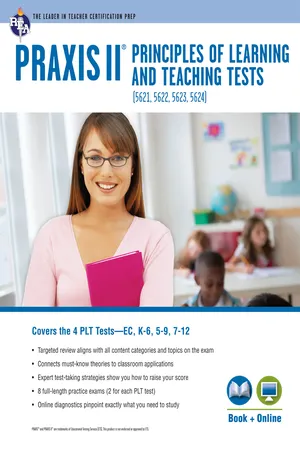
- 300 pages
- English
- ePUB (mobile friendly)
- Available on iOS & Android
PRAXIS® PLT EC, K-6, 5-9 and 7-12: Book + Online
About this book
REA's Praxis II: PLT EC, K-6, 5-9, 7-12 Test Prep with Online Practice Tests
Gets You Certified and in the Classroom! Nationwide, more than 5 million teachers will be needed over the next decade, and all must take appropriate tests to be licensed. REA gets you ready for your teaching career with our outstanding library of Teacher Certification test preps.Our test prep is designed to help teacher candidates master the information on the Praxis II: PLT EC, K-6, 5-9, 7-12 exams and get certified to teach. It's perfect for college students, teachers, and career-changing professionals who are looking to qualify in states where this exam is required.This study package contains in-depth reviews of all the competencies tested on the PRAXIS II: Principles of Learning and Teaching exams (5621, 5622, 5623, 5624). Based on actual PRAXIS questions, four full-length practice tests (one for each exam) in the book feature every type of question, subject area, and skill tested on each of these exams. An additional full-length practice test for each exam is also offered online in a timed format with instant scoring, diagnostic feedback, and detailed explanations of answers. Our online practice tests replicate the question format, allowing you to assess your skills and gauge your test-readiness. The online tests at REA's Study Center include detailed scoring analysis and diagnostic tools. Automatic scoring and instant reports help you zero in on the topics and types of questions that give you trouble now, so you'll succeed when it counts. Every practice exam comes with detailed feedback on every question. We don't just say which answers are right - we explain why the other answer choices are wrong - so you'll be prepared on test day.This complete test prep package comes with a customized study schedule and REA's test-taking strategies and tips. This test prep is a must-have for anyone prepping for the PRAXIS PLT exams!
Frequently asked questions
- Essential is ideal for learners and professionals who enjoy exploring a wide range of subjects. Access the Essential Library with 800,000+ trusted titles and best-sellers across business, personal growth, and the humanities. Includes unlimited reading time and Standard Read Aloud voice.
- Complete: Perfect for advanced learners and researchers needing full, unrestricted access. Unlock 1.4M+ books across hundreds of subjects, including academic and specialized titles. The Complete Plan also includes advanced features like Premium Read Aloud and Research Assistant.
Please note we cannot support devices running on iOS 13 and Android 7 or earlier. Learn more about using the app.
Information
Table of contents
- Cover
- Title Page
- Copyright Page
- Foreword
- Contents
- About Our Author
- About Research & Education Association
- Acknowledgments
- INTRODUCTION
- PRAXIS PLT Practice Tests
- PLT Early Childhood (0621/5621)Practice Test 1
- PLT Grades K-6 (0622/5622)Practice Test 1
- PLT Grades 5-9 (0623/5623)Practice Test 1
- PLT Grades 7-12 (0624/5624)Practice Test 1
- Index